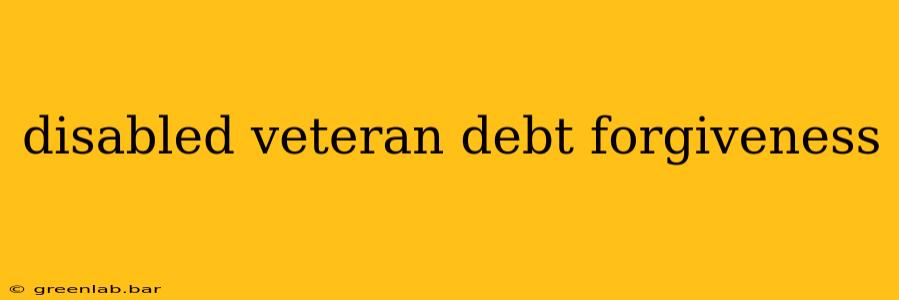For disabled veterans, the challenges of transitioning to civilian life can be significant, and financial burdens often exacerbate these difficulties. Fortunately, several programs offer debt forgiveness or relief specifically designed to assist disabled veterans. Understanding these options is crucial to accessing the support you deserve. This guide provides a comprehensive overview of available programs and the steps involved in applying for debt relief.
Understanding Your Eligibility
Before exploring specific programs, it's important to understand the general eligibility criteria. Most programs require proof of your disability rating from the Department of Veterans Affairs (VA). This rating is determined by the severity of your service-connected disability. The higher your disability rating, the more likely you are to qualify for certain programs. In addition to your disability rating, income limits and other specific requirements may apply depending on the program.
Key Programs Offering Debt Forgiveness or Relief for Disabled Veterans
Several programs offer assistance, each with its own set of requirements and benefits. Let's examine some of the most prominent ones:
1. Student Loan Forgiveness Programs
The Department of Education offers several programs that may forgive or discharge student loan debt for disabled veterans. These include the Total and Permanent Disability (TPD) discharge and the application for discharge based on an inability to work. It's critical to carefully review the application processes and eligibility requirements for each program. The specific requirements and processes can be complex and change, so staying up-to-date on the latest information from the Department of Education's website is essential.
2. VA Home Loan Benefits and Debt Relief
The VA offers home loan guarantees to eligible veterans, including those with disabilities. While not direct debt forgiveness, these benefits can significantly reduce the financial burden of homeownership. If you’re struggling with mortgage debt, exploring options like loan modification or refinancing through the VA may be beneficial. Understanding your VA loan options and seeking guidance from a VA-approved lender is recommended.
3. State and Local Programs
Many states and localities offer additional financial assistance programs for disabled veterans. These programs vary widely in their offerings and eligibility requirements. It's important to research the programs available in your specific state and locality. Contact your state's Department of Veterans Affairs or local veteran service organizations to learn about potential resources in your area.
4. Debt Consolidation and Management
Even if you don't qualify for complete debt forgiveness, consolidating your debts into a single, manageable payment can provide significant relief. Several organizations offer debt management services specifically designed to assist veterans. Consulting with a reputable financial advisor specializing in veteran affairs can help you explore these options and create a personalized debt management plan.
Steps to Take
- Determine Your Disability Rating: Obtain official documentation of your VA disability rating.
- Research Available Programs: Thoroughly investigate the programs listed above and others relevant to your specific situation.
- Gather Necessary Documentation: Collect all required documentation, including proof of income, disability rating, and relevant financial records.
- Complete Applications: Carefully fill out and submit all necessary applications.
- Seek Professional Assistance: Consider seeking help from veteran service organizations or financial advisors specializing in veteran affairs.
Conclusion
Navigating the world of debt forgiveness as a disabled veteran can be challenging. However, understanding the available resources and diligently pursuing available programs can significantly alleviate financial burdens and improve your quality of life. Remember that persistence and seeking professional guidance are key to accessing the support you deserve. Don't hesitate to reach out to veteran support organizations and government agencies for assistance throughout this process. Your service and sacrifice deserve recognition and support, and there are resources available to help you navigate these financial challenges.

